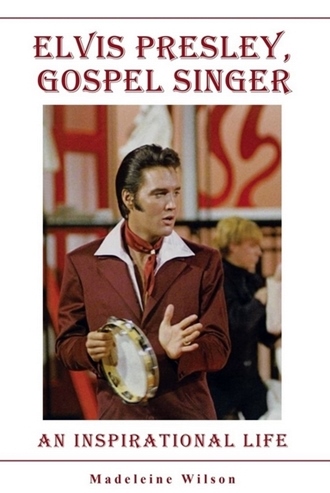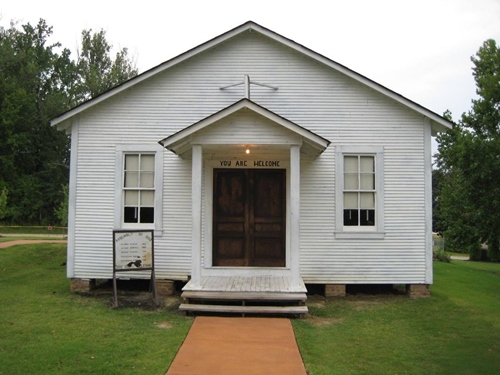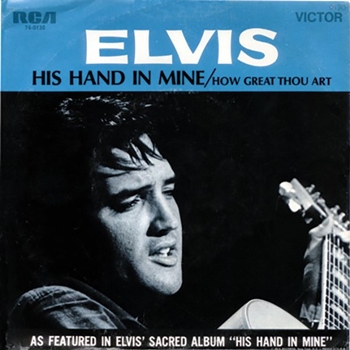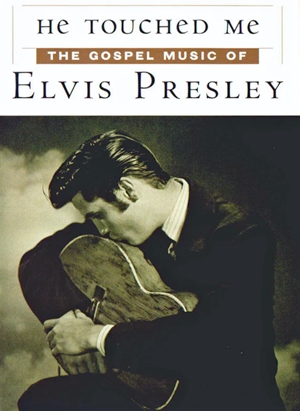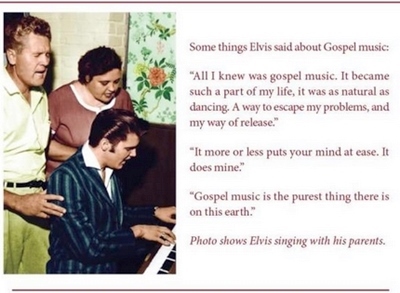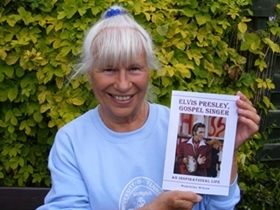 |
 |

Book Review Elvis Presley, Gospel Singer: An Inspirational Life by Madeleine Wilson Shalom Publishing, UK, 2022 Reviewed by Nigel Patterson, August 2022
Elvis, “The King”, many times said publicly that there is only one King, and that is Jesus Christ. He not only acknowledged the Lord but also worshipped Him and prayed to Him, often. (Madeleine Wilson) It has been said that the formula of a great tragedy is that a fatal flaw prevents tremendous potential from being realized, and the ending is one of ruin not of joy. In many ways, the life story of Elvis Presley can be seen as one of tragedy… (from the Introduction) Madeleine Wilson’s new book, Elvis Presley, Gospel Singer: An Inspirational Life, documents the seminal influence and importance of his Christian faith and gospel music and tradition, in Elvis’ life. Considering how central gospel music was to Elvis, it is surprising there is not a larger and more robust catalog of books on the subject. Compared to the hundreds of books on Elvis’ life, music, and films, there only around a dozen books focusing on Elvis and gospel music, and a number of these are not solely about the theme. Even fewer consider the binary forces of Elvis’ Christian faith and gospel music, in shaping his story. As most fans know, during his lifetime, the only (three) Grammy awards Elvis received were for his gospel recordings. In this context, the release of Madeleine Wilson’s thoroughly researched and thoughtful book is long overdue, and a welcome addition to the Elvis literary canon. The author has a strong Christian faith, and this is reflected in her consideration of her subject, and arguably gives her a greater understanding of how those forces impacted Elvis. Ms. Wilson’s approach is impressive and makes her book stand out from others. She has written Elvis Presley, Gospel Singer in biographical format, interweaving the role of Elvis’ Christian faith and love of gospel music at each stage and event in his complex, and storied life. It is essentially Elvis’ Christian biography. As the basis for Elvis Presley, Gospel Singer is to focus on his faith and gospel music as they impacted his life, the author does not dissect Elvis’ studio gospel sessions, but rather, draws attention to particularly important recordings in the context of his life and career (including home recordings, Crying In the Chapel, and the gospel songs he sang in concert).
Ms. Wilson has a strong and easy-going writing style which engages the reader. Her description of how Elvis’ life evolved is rich in detail and context. For example, her discussion of Elvis growing up in Tupelo resonates with important information about the Bible Belt, raising patriots, the terrible destruction of the tornado that ripped through Mississippi in 1936, and Vernon Presley’s unfortunate incarceration. It details the Presley family’s involvement at church and how the foundation for Elvis’ faith was established. In a passage reflected slightly differently in the current Elvis biopic from Baz Luhrmann, the author observes that Elvis regularly attended the AoG (Assembly of God) church in Adams Street, East Tupelo, and:
Elvis’ generosity to others is well documented, and Ms. Wilson comments:
In the face of success, distractions and temptations, it can be difficult to maintain and practice one’s faith. The author discusses when the dominance of Christian faith started to weaken in Elvis life, it coincided with him becoming a film star in Hollywood. Importantly, Elvis realized the issue, and it weighed heavily on his mind:
While Elvis’ Hollywood years would see him drift apart away from direct involvement with the church, the connection he had with his faith continued to be experienced through his love of gospel music, both at home, and in the recording studio. In this respect, while many biographies downplay Elvis’ film career, at least through the 1960s, Ms Wilson celebrates the gospel music offered in Elvis’ final two narrative films, The Trouble With Girls and Change of Habit. During what is regarded as Elvis’ concert years (1969-1977), his connection to his faith was apparent in his live performances where songs such as How Great Thou Art, Why Me, Lord?, and the inspiring, An American Trilogy, were mainstays in his song list.
As An American Trilogy suggests, the narrative is not confined to Elvis’ gospel songs. The author notes that a number of Elvis’ non-gospel recordings, like Trilogy, are inspirational. In discussing Always On My Mind, Ms Wilson poignantly comments:
When reading Elvis Presley, Gospel Singer, we also learn many things that we may not have previously known or had long forgotten. For instance, Elvis’ comments to promoter, Jerry Weintraub, on having to play Madison Square Garden in 1972 may surprise some readers:
While Elvis may have had doubts, history shows that he was the first music act to “sell out” four consecutive shows at the Garden, playing to a total of 80,000 appreciative fans and producing one of his most exciting “live concert” albums! Not surprisingly, the chapter around Elvis’ death is full of emotional recollections and moments, including a contribution from Wanda June Hall, who recorded some of her telephone conversations with Elvis, and provides Elvis’ take on his life and death. The chapters, Life After Death and The Beat Goes On, discuss how Elvis’ gospel music continues to be celebrated worldwide post his death in 1977, from being an integral part of fan club meetings and the European Walk A Golden Mile In My Shoes tribute artist contest, to Gospel events during Elvis Week at Graceland and as part of annual Elvis festivals in countries as far flung as Australia (Parkes Elvis Festival) and Germany (European Elvis Festival). Reflecting the diverse range of information in the book, there is also information about churches based around Elvis, Elvis’ Induction into the Gospel Hall of Fame, Elvis receiving the Presidential Medal of Freedom, the He Touched Me: The Gospel Music of Elvis Presley DVD, Where No One Stands Alone CD, and also the burning question, “Does God visit shopping malls?”
Many readers will also be interested in the (albeit sometimes brief) coverage of:
…………. various other important issues, that populate the book. The text also includes neat moments of humour:
Adding gravitas to the author’s informative narrative is the use of quotes by those who knew, were family, and/or worked with Elvis. Those providing quotes about Elvis as a person and his relationship with his faith and gospel music include Priscilla Presley, Dixie Locke, Little Richard, B.B. King, James Brown, J.D. Sumner, Sammy Davis Jr., Terry Blackwood, Joe Moscheo, David Stanley, James Burton, Ronnie Tutt, Jerry Scheff, Patti Perry, Patsy Gambill, and Wanda June Hill. One striking quotation is from Rev. Jack Hyles, who shared a radio station lift with Elvis in Texas. Rev. Hyles struck up a conversation with Elvis and asked him if he died that evening, did he know for sure that he would go to heaven. Elvis replied that he did know, and when questioned about how he knew, Elvis replied that:
The author’s Epilogue is titled, Why? It ends with a clever statement comprised of song titles that Elvis may have said to his fans if he was still alive today.
The book closes with five interesting Appendices:
The book is dotted by various montages of photos from throughout Elvis’ life. They are mostly in colour and while the images are quite small, they are diverse, interesting, and relevant to the narrative. Elvis Presley, Gospel Singer: An Inspirational Life is available in both softcover (ISBN-13: 978-1802272550) and e-Book (ISBN-13: 978-1802272567) formats. Overall Verdict: As I mentioned at the beginning of my review, Elvis Presley, Gospel Singer – An Inspirational Life, is a long overdue entry in the Elvis literary canon. By interweaving how Elvis’ Christian faith and gospel music influenced his life and career, Madeleine Wilson has written a cogent and wonderful account of what were primary forces in determining who Elvis Presley was, both as a person and an artist.
Click to comment on this Review Book Review by Nigel Patterson.
EIN Website content © Copyright the Elvis Information Network.
Elvis Presley, Elvis and Graceland are trademarks of Elvis Presley Enterprises. The Elvis Information Network has been running since 1986 and is an EPE officially recognised Elvis fan club.
. |
|

